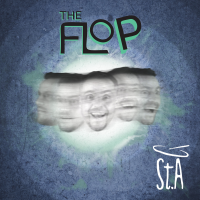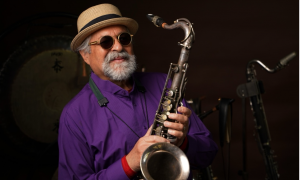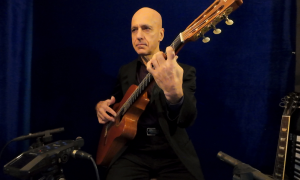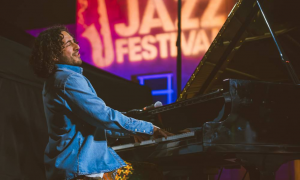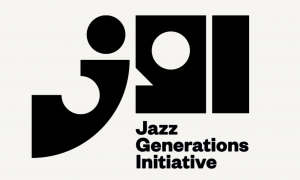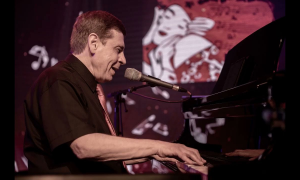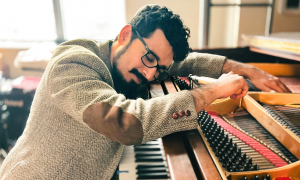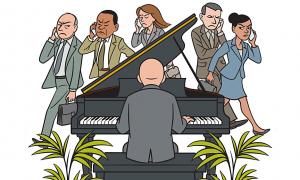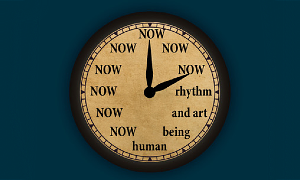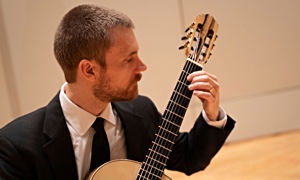Moreover like other polymaths, he sees the desire for social change connected to his desire to play, regarding both music and social activism as things worth working toward achieving, even more so now that he has started a family.

It's not uncommon for musicians to lend their name and/or time to charitable causes. Sometimes these people even have a second life as a hands-on leader of the organization—Bob Geldof comes to mind here. Jazz musicians, on the other hand, tend to lean more toward a grass-roots kind of thing, such as starting schools (see the Ralph Alessi profile) or mentoring young musicians.
But in looking at Danilo Pérez, you wonder where he finds the energy: The Panamanian pianist's current résumé includes being artistic director of the brand-new Berklee Global Jazz Institute, founder and president of the Panama Jazz Festival, global ambassador for UNICEF and head of the Fundación Danilo Pérez. Never mind the fact that he's a working musician leading bands and playing with, among others, Wayne Shorter's landmark acoustic quartet. All these non-music activities are extremely valid, but one could accuse Pérez of being a little ADD.
“I do all the extra activities because I enjoy them," Pérez recently explained via e-mail. “Music has more than one dimension, and performing without living life to the fullest is like playing piano in front of a wall, the sound you make hits the wall then it goes back to you, and that's it, nowhere else."
Pérez concedes that he struggles to find time to do all the things he wants to do, but he benefits by the fact that he only needs about 4-6 hours a sleep per night. Moreover like other polymaths, he sees the desire for social change connected to his desire to play, regarding both music and social activism as things worth working toward achieving, even more so now that he has started a family.
This all goes a long way towards explaining the title of his 10th album as a leader, 'Providencia,' which is Spanish for “providence." The word means something akin to divine guidance or divine care, but when asked about the title, the pianist has his own definition: “It is an invitation to be prepared for the unknown. It is also inspired by the idea of the kind of world we will leave for future generations. I think about the children—including my own—and ask myself if we can do anything to leave them a better world."
It's an inspirational message and fortunately the music on the album holds up its end of the bargain as well. Danilo Pérez has long been a master of blending his Latin folk music roots, his classical music training and his own passion for jazz. Sometimes his projects lean more one way—'Across the Crystal Sea' and 'Panama Suite' are elegant orchestral jazz works—but the new one does an excellent job of balancing the three sides of this musical troika.
According to the 43-year-old composer, “I have been working on these three styles for more than 20 years and the result comes from a long process of conscious and unconscious trial and error that expresses today in a much more natural way than 20 years ago, when I thought the styles were separated entities. With time, I have come to realize there is only one style of music, and that is music itself."
The 10-minute 'Daniela's Chronicles' is the most wide-ranging example of this philosophy, moving back and forth between classical piano filigree, earthy folk rhythms and some bebop passages. More concise are highlights like 'Galactic Panama' and 'Cobilla,' where alto saxophonist Rudresh Mahanthappa and (on the latter) vocalist Sara Serpa join Pérez's core trio. The aptly named 'Bridge of Life Pt. I' is another fine fusion, featuring a downright swinging arrangement that emphasizes French horn, bassoon, flute and oboe.
The 11 tracks, however, flow from one to the next seeming all part of Pérez's master plan, both in life and music. “Music is one part of a whole universe," he adds. “And all the small parts of music I was always so obsessed about, cannot grow without the presence of the other. Today I feel I can express the unity of the different elements of music with real life much better than 25 years ago, when I did not have the life experiences to back up any of my musical statements."
But in looking at Danilo Pérez, you wonder where he finds the energy: The Panamanian pianist's current résumé includes being artistic director of the brand-new Berklee Global Jazz Institute, founder and president of the Panama Jazz Festival, global ambassador for UNICEF and head of the Fundación Danilo Pérez. Never mind the fact that he's a working musician leading bands and playing with, among others, Wayne Shorter's landmark acoustic quartet. All these non-music activities are extremely valid, but one could accuse Pérez of being a little ADD.
“I do all the extra activities because I enjoy them," Pérez recently explained via e-mail. “Music has more than one dimension, and performing without living life to the fullest is like playing piano in front of a wall, the sound you make hits the wall then it goes back to you, and that's it, nowhere else."
Pérez concedes that he struggles to find time to do all the things he wants to do, but he benefits by the fact that he only needs about 4-6 hours a sleep per night. Moreover like other polymaths, he sees the desire for social change connected to his desire to play, regarding both music and social activism as things worth working toward achieving, even more so now that he has started a family.
This all goes a long way towards explaining the title of his 10th album as a leader, 'Providencia,' which is Spanish for “providence." The word means something akin to divine guidance or divine care, but when asked about the title, the pianist has his own definition: “It is an invitation to be prepared for the unknown. It is also inspired by the idea of the kind of world we will leave for future generations. I think about the children—including my own—and ask myself if we can do anything to leave them a better world."
It's an inspirational message and fortunately the music on the album holds up its end of the bargain as well. Danilo Pérez has long been a master of blending his Latin folk music roots, his classical music training and his own passion for jazz. Sometimes his projects lean more one way—'Across the Crystal Sea' and 'Panama Suite' are elegant orchestral jazz works—but the new one does an excellent job of balancing the three sides of this musical troika.
According to the 43-year-old composer, “I have been working on these three styles for more than 20 years and the result comes from a long process of conscious and unconscious trial and error that expresses today in a much more natural way than 20 years ago, when I thought the styles were separated entities. With time, I have come to realize there is only one style of music, and that is music itself."
The 10-minute 'Daniela's Chronicles' is the most wide-ranging example of this philosophy, moving back and forth between classical piano filigree, earthy folk rhythms and some bebop passages. More concise are highlights like 'Galactic Panama' and 'Cobilla,' where alto saxophonist Rudresh Mahanthappa and (on the latter) vocalist Sara Serpa join Pérez's core trio. The aptly named 'Bridge of Life Pt. I' is another fine fusion, featuring a downright swinging arrangement that emphasizes French horn, bassoon, flute and oboe.
The 11 tracks, however, flow from one to the next seeming all part of Pérez's master plan, both in life and music. “Music is one part of a whole universe," he adds. “And all the small parts of music I was always so obsessed about, cannot grow without the presence of the other. Today I feel I can express the unity of the different elements of music with real life much better than 25 years ago, when I did not have the life experiences to back up any of my musical statements."
For more information contact All About Jazz @ Spinner.








